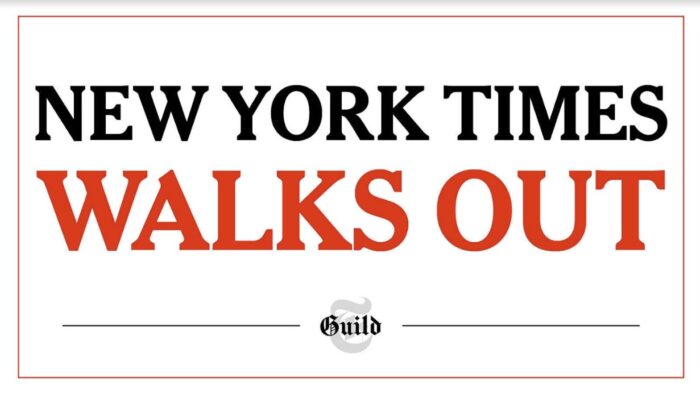
Nearly 1,200 New York Times journalists in The New York Times Guild began a 24-hour strike on Thursday at midnight, after months of bargaining with management to reach a new contract failed. The previous employee contract expired in March 2021.
The Times journalists join employees at the Pittsburgh Post-Gazette, many of whom have been on strike since October, and journalists at the Fort Worth Star-Telegram, who have been on strike since November 28.
The New York Times Guild argues that while the paper is flourishing economically, profits haven’t been shared fairly with workers. Times employees on strike plan to protest outside the company’s headquarters in Manhattan at 1 p.m. ET on Thursday.
The act of protest, which has not been staged by employees at the newspaper of record in decades, will leave many of its major desks depleted of their staffs, creating a challenge for the news organization that millions of readers rely on.
An executive at the Times, who requested anonymity to speak candidly, acknowledged to CNN on Wednesday that the work stoppage would certainly create difficulties. But, the executive said, management has readied for the moment and could rely on the newspaper’s other resources, such as its international staff which largely are not part of the union, to fill the voids.
Joe Kahn, executive editor of the Times, said in a note to staff, “We will produce a robust report on Thursday. But it will be harder than usual.”
Times journalists encouraged readers not to engage with any Times products during the strike, and yes, that means reading about Brittney Griner’s release elsewhere and breaking your Wordle streak. Critic-at-large and VP of the Guild Amanda Hess:
We’re asking readers to not engage in any @nytimes platforms tomorrow and stand with us on the digital picket line! Read local news. Listen to public radio. Make something from a cookbook. Break your Wordle streak.
— Amanda Hess (@amandahess) December 7, 2022
I try not to cross picket lines, but for Nieman Lab purposes was curious to see specific ways that the strike was affecting Times output Thursday, so I fired up an RSS reader that I hadn’t used in several years. A few things I noticed:
“From my point of view, this is an absolutely necessary shot across the bow,” says guild member Michael Powell, a veteran reporter who covers free speech matters for the New York Times national desk. “We’re approaching two years without a contract, which means we’re approaching two years without a raise….Each month that goes by, they’re taking more money out of our pocket.”
Several managers at the Times, speaking to NPR on condition of anonymity because they were not authorized to comment, acknowledge concern about the tensions and the burden of putting out the paper without hundreds of their colleagues.
Editors are scrambling to make sure long-held stories are ready for publication. Some are preparing to flex dormant reporting muscles. Others are unlikely to miss a step. But the sheer volume of copy produced by the paper’s newsroom each day is unlikely to be matched with more than half of the chairs metaphorically empty.
NYT management is trying to ride out the walkout using a mix of pre-written stories from guild staff (it has a lot of those) and a skeleton crew + editors to handle breaking news. Here’s the un-bylined story for Griner’s release: pic.twitter.com/sZW5MWfojY
— Peter Kafka (@pkafka) December 8, 2022
If you see someone's name on a story on Thursday or Friday, it does not necessarily mean they crossed the picket line to write it. Newspapers often have reporters write portions of stories ahead of time when possible.
— NYTimesGuild (@NYTimesGuild) December 8, 2022
A rare unbylined @nytimes story: https://t.co/sYUJwcO7kQ
— David Gura (@davidgura) December 8, 2022
A news alert with my name on it just went out. It was a pre- written story ahead of an expected vote.
I stand with the guild!
— Annie Karni (@anniekarni) December 8, 2022